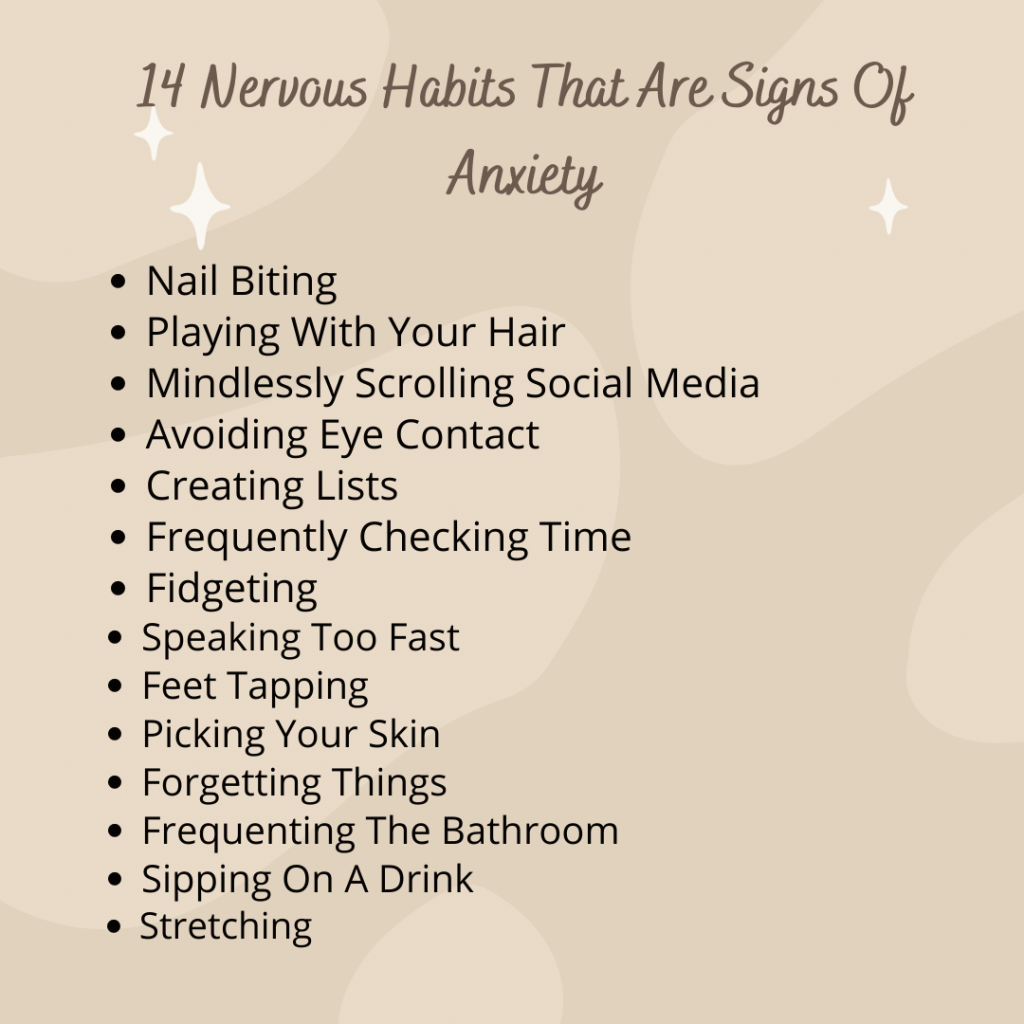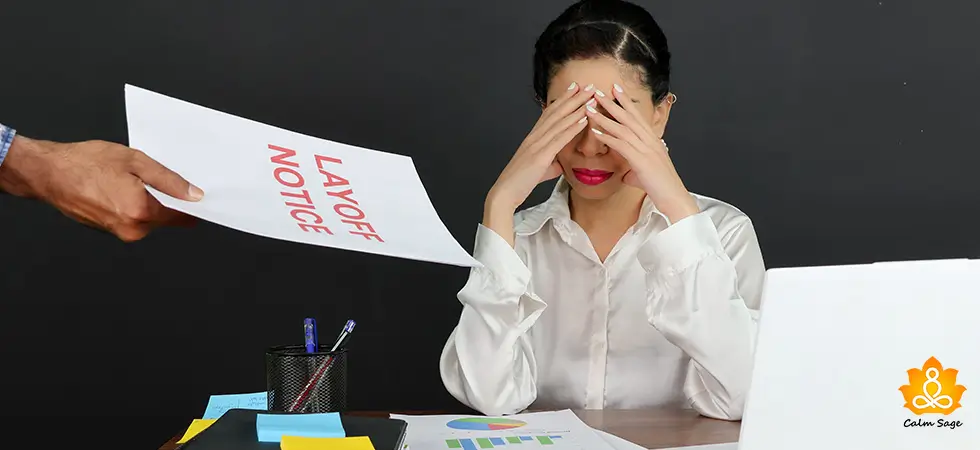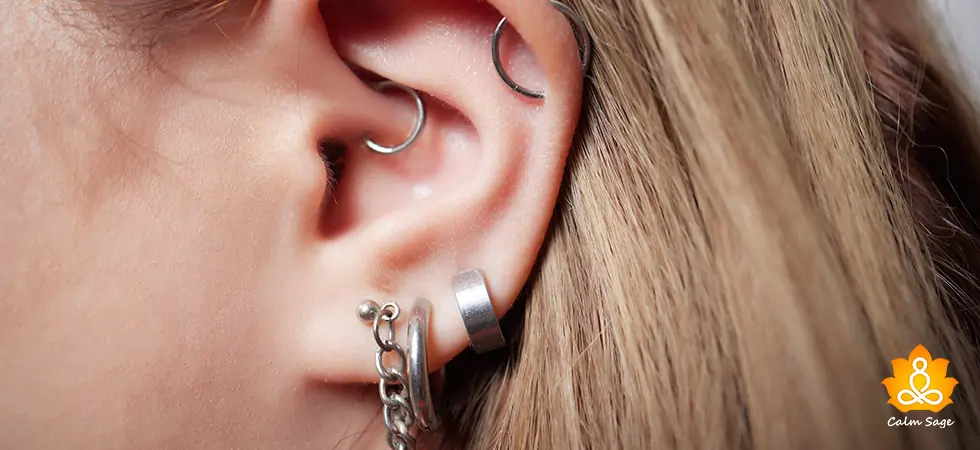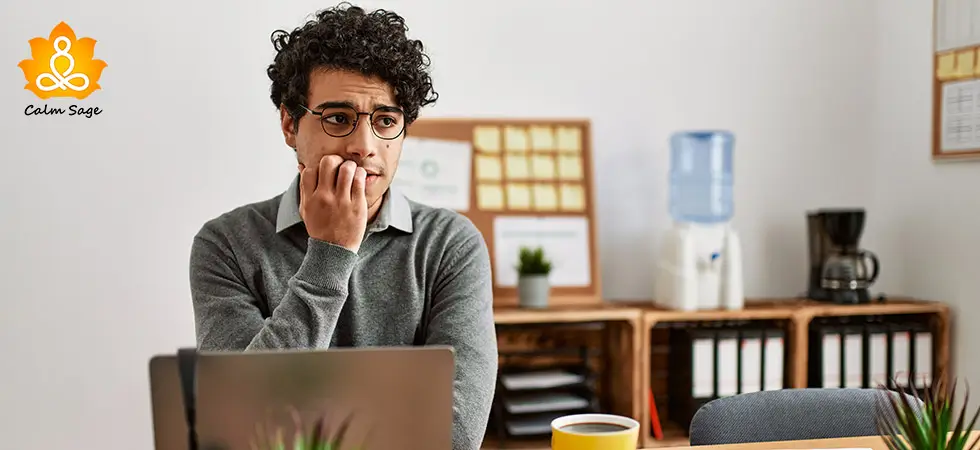10+ Nervous Habits That Are Signs Of Anxiety (And How To Stop Them)

If you’re an anxious person, then the nervousness you feel when waiting for your date at a restaurant can be more than just nerves. The fidgeting, the sweating, or idly twirling of your hair can be subtle nervous habits that can pop up when your anxiety is high.
Maybe you brush off these nervous habits as little quirks but when they continue and become excessive (even compulsive) then these little repetitive nervous habits should not be ignored for they can be a symptom of underlying anxiety, depression, or other conditions.
Anxiety symptoms are not always blatantly noticeable. They can be subtle and while they aren’t exactly harmful, they can be uncomfortable.
Before we look into the most common nervous habits, let’s understand why we engage in nervous habits below.
What Causes Nervous Habits?
Many reasons can make you develop nervous habits. One, they can be a subtle way to self-soothe or distract you from whatever is bothering or has triggered your anxiety. Some of the anxiety habits can either be unconscious or conscious.
Two, some of these nervous habits can also be a way to help you fight the stress response aka the flight or fight response. This response is activated when you feel threatened or believe you’re in danger. If your body signals you to flee but you can’t escape the situation, your body will develop coping mechanisms such as nervous habits to repress the urge.
Despite the causes of nervous habits, it’s not uncommon for people to develop nervous habits without a valid reason. Sometimes, these nervous habits can simply be a way to relieve boredom or give yourself something to fidget with when you’re doing something mundane as watching TV.
Are you, unknowingly, engaging in repetitive nervous habits to ease the anxiety discomfort? If yes, then with the right help, you can stop nervous habits from creating additional stress. Before we look into the ways to stop nervous habits, let’s take a look at some of the most common anxiety nervous habits.
14 Common And Repetitive Nervous Habits
1. Nail Biting
One of the most common repetitive nervous habits is nail biting. Nail biting is often associated with anxiety and nerves. If you’re a nail-biter then you know how this habit can become repetitive. When someone is anxious, they just want to do something with their hands to alleviate the restless energy so one of the common nervous habits that develop is nail biting.
2. Playing With Your Hair
Occasionally twirling your hair is OK, even fun. But when this occasional habit turns into twisting and pulling, it can be a severe sign of anxiety. Playing with your hair is a common nervous habit to alleviate anxiety. When it becomes too extreme, the nervous habit can be called trichotillomania, a compulsion.
3. Mindlessly Scrolling Social Media
Most of us (even me) are guilty of this nervous habit. When you are anxious or nervous, you can find yourself mindlessly scrolling through your phone without registering the action.
This habit also gives us something to keep our hands busy while our brains are stuck in a loop of anxious thoughts. Sometimes, this nervous habit can be used to avoid eye contact, another nervous habit, in a social setting.
4. Avoiding Eye Contact
More often than not, this nervous habit can be chalked up to a lack of confidence or being arrogant, however for people with social anxiety, avoiding eye contact is a nervous habit. When this nervous habit often triggers anxiety or if anxiety triggers this nervous habit, it can be termed eye contact anxiety.
5. Creating Lists
Being organized is a good thing, isn’t it? But is it when your need to be organized is born out of nervousness? What you might not know is that creating too many lists can also be a nervous habot to control anxious thoughts and feelings.
One of the common symptoms of anxiety is losing control, so many people find creating lists a way to take back control and alleviate anxiety.
6. Frequently Checking Time
If you find yourself looking at the time frequently, then it can also be anxiety and a nervous habit. More often than not, this nervous habit can become an automatic gesture. If you find yourself engaging in this habit, then you may look at the time but not register the time as our brain is still focusing on anxious thoughts.
7. Fidgeting
Another common repetitive nervous habit is fidgeting. If you can’t stay still or find yourself squirming or fidgeting in your seat, it can be a sign of nervousness and anxiety. Anxiety can cause feelings of restlessness and tension that can be hard to release. Fidgeting is a common way to release restless energy and tension.
8. Speaking Too Fast
When you’re nervous, it’s common to speak fast but when it becomes constant, speaking fast can become a nervous habit of anxiety. More often than not, this nervous habit can make it harder for others to understand what you’re saying and be asked to repeat yourself. This action can make your anxiety worse.
9. Feet Tapping
Nervous energy needs an outlet and what’s the best way other than foot-tapping? If your nervous habit is feet tapping, then to others, it can be a sign of you being irritated or impatient when the truth is that you’re just anxious. This nervous habit can be easy to stop. All you need to do is do deliberate foot exercises to keep the nervous energy at bay.
10. Picking Your Skin
Picking your skin is another nervous habit with fingers that should be taken as a sign of anxiety and nervousness. This nervous habit is another self-soothing act that you may engage in to keep your stress at bay. While it may keep your mind and body occupied, it is not a healthy coping technique.
11. Forgetting Things
A sign of anxiety also includes being forgetful about little things and important details. When you’re too anxious or worried, forgetting can become a nervous habit too. When your mind to too cluttered with anxious thoughts, there’s hardly any room to focus on the present, hence forgetting things.
12. Frequenting The Bathroom
Sometimes, it’s not just a medical condition that makes you frequent the bathroom. Anxiety can be one of the reasons too. When you’re anxious or nervous, frequenting the bathroom can become a nervous habit. One of the common symptoms of anxiety and stress can include stomach issues, hence making you frequent the bathroom to alleviate the pain.
13. Sipping On A Drink
If you are struggling with social anxiety, then as a nervous habit to cope with your anxiety, you may find yourself sipping on a drink in a social setting. This nervous habit can also be an avoidance tactic to avoid making or engaging in conversations. However, one of the common symptoms of anxiety includes a dry mouth so if you find yourself sipping on a drink frequently in a social setting, you may be struggling with more than just nerves.
14. Stretching
Muscle tension is another symptom of anxiety and can be a physical manifestation of the stress response (flight-or-fight response). Even if it’s not your anxiety, you may often find yourself stretching your limbs, fingers, or toes to lose the tension. These stretches can either be conscious or subconscious but either way can be a nervous habit that can indicate anxiety or muscle tension.

How To Stop Nervous Habits?
Here are some tips to help you stop nervous habits:
- If you’re a nail-biter, then you can try to keep your hands in your pocket when you find your anxiety rising and the urge to bite your nails with it. You can also try to use a stress ball to keep your hands busy.
- If you’re a nervous smoker, then you can use nicotine patches or gums to quit the habit, gradually. The aim is to change your behavior.
- You can also try to become more aware of your nervous habits. For example, if you’re a nail-biter, instead of reminding yourself to not bite your nails, you can say to yourself, “I’m going to be mindful when I bite my nails and will take them out, intentionally.”
Reminder: If you slip up, don’t be too hard on yourself. It’s OK to slip and make a mistake. It means that you’re aware of your nervous habits and are trying to fix them. Keep working on them. You’re doing great!
Nervous habits pop up when you’re too anxious and stressed. They are not harmful but can be uncomfortable. While they are a temporary way to alleviate stress and nervous energy, they are not a permanent or long-term solution.
If your anxiety is interfering with your personal, professional, and social life, then you should consult a mental health professional for a consultation.
For more, you can write to us at info@calmsage.com or DM us on social media. You can also share your tips to deal with repetitive nervous habits in the comments section below.
Take Care!




















